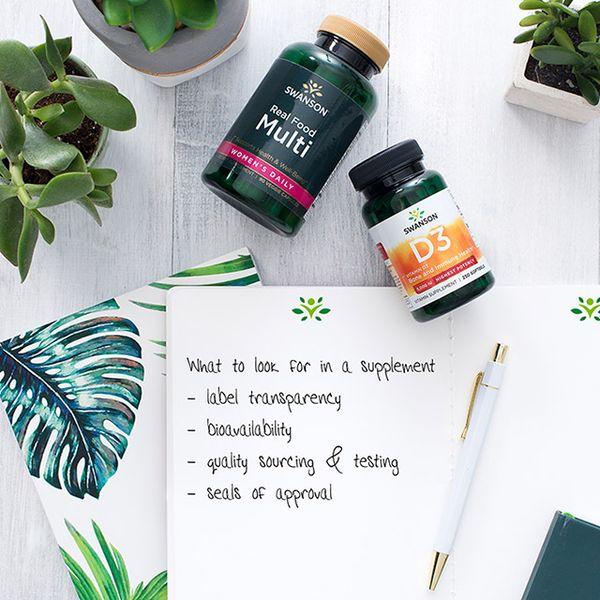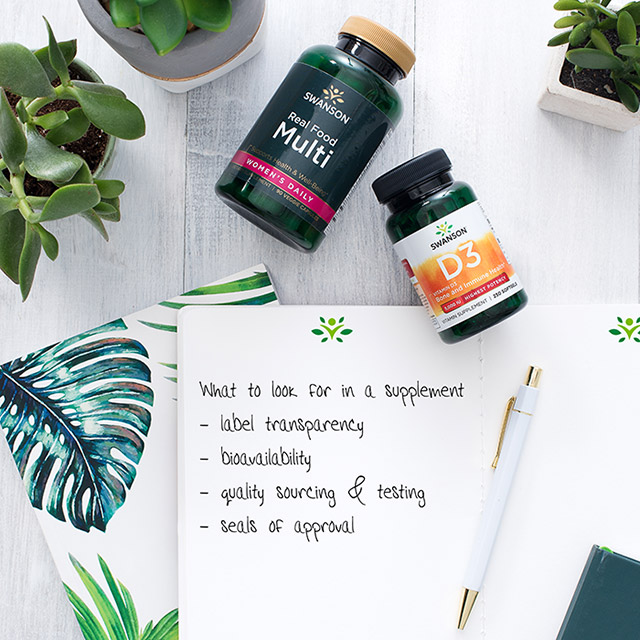Choosing the Best Supplements
In a perfect world, we would get all the nutrients we need from the foods we eat. Unfortunately, many of us don’t even come close. Most people do not meet their daily requirements for essential vitamins and minerals.1 That’s primarily because we eat a lot of processed foods instead of getting our full servings of fruits and vegetables each day.
While eating real foods more often will help, many of them can be less nutritious than they should be thanks to depleted soils, farming and fertilization practices, the extended time it takes for our food to make it from farm to plate and if we cook them rather than eating them in their raw form.
Supplements are a practical way to make sure we get the nutrients we need to help promote total-body wellness. But how do you know which supplements to take? And how can you tell if your supplement ingredients are of high quality? That’s exactly what we’re here to discuss. First, let’s talk about how to know which nutrients you need.
Tips for Choosing Quality Supplements

Is a daily multivitamin right for you? Get the expert's insight from Swanson's in-house licensed nutritionist, Britta Sather:
Which Vitamins and Minerals Do I Need?
Deciding which vitamins and minerals you should take to supplement your diet, and how much of each you should take, depends on a lot of things. The National Institutes of Health provides guidelines for the recommended daily doses for each vitamin and mineral depending on your age and some other factors, but there’s more to it than that. Your lifestyle, stress levels, the food you eat, environment, and much more come into play.
Consider Your Nutrient Needs
Your nutritional needs depend on the following factors:
Age
The way your body processes nutrients is intricate and our nutritional needs change as we age. Certain hormonal changes, as well as lifestyle changes related to aging, can affect which supplements you should take.
Diet
The types of foods you eat also play a big role in which nutrients you should take as a supplement, and how much you should take. It’s more complicated than just meeting a standard daily fill, though. Certain foods and drinks you consume may prohibit or enable absorption of other vitamins. If you are a tea or coffee drinker, you may need to take more iron. And even if you consume a lot of vitamin D, if you are deficient in magnesium your body won’t absorb it properly.
Health
Your digestive health and certain medical conditions can interfere with how efficiently your body absorbs vitamins, and some medications may affect which supplements you can or should take. Also, if you are taking birth control or are pregnant, you may need to take more of certain vitamins and minerals. If you have a medical condition, are taking medications, or you are pregnant, you should talk with your doctor about the right supplements for you.
Lifestyle
If you drink alcohol, use tobacco or are regularly exposed to toxins or pollutants, your body may not absorb some nutrients efficiently, and you could benefit from taking more of certain antioxidant vitamins. Also, if you are under a lot of stress, it may affect the nutrients you need. For example, stress causes your body to use more magnesium. For more on magnesium, read Magnesium Benefits and Uses.
Family History
Your health heritage can tell you a lot about potential health problems or risks that are common in your family and you might want to choose your supplements with those risks in mind. Learning about your family health history can help inform your daily wellness planning.
To decide which vitamins you should take, it may be helpful to keep a log of your diet for a couple of weeks and do some research based on your individual needs. If you aren’t sure which vitamins you need to take after considering your age, diet, and the other factors listed above, consult a dietician or doctor to be sure. Then, use the guidelines below to choose high-quality supplements.
Use These Tips to Choose Your Supplements
When choosing dietary supplements to take every day, you want to know that you’re getting exactly what you expect – nothing more and nothing less. The quality of ingredients in supplements matter, as does where they come from and how they are manufactured. Here are a few things you should check for.
What to Look for in a Supplement
- Good Manufacturing Seals: Look for seals of approval from respected, third-party organizations like ConsumerLab.com, NSF International and U.S. Pharmacopeia, which indicate that the product has been tested for quality and purity by someone other than the manufacturer.
- Transparency in Labeling: Supplement labels should list all ingredients, both active and inactive. Avoid products from manufacturers that hide the ingredients in their proprietary blends.
- Quality of Ingredients & Sourcing: Low-quality nutrients are poorly absorbed. Do some research and look for sourcing information, high-quality ingredients that are minimally processed, and steer clear of artificial or unnecessary additives. Also, look for ingredients and products with bioavailability information. Bioavailability indicates that an ingredient or product is effectively absorbed and utilized by your body, and clinical studies and product tests help ensure that products and ingredients work with the body as they are intended to. At Swanson, we're committed to bringing you science-backed, innovative products that have certificates of authenticity and do not use experimental stimulants and Rx ingredients.
- Price and Satisfaction Guarantees: Choose products from a company that guarantees you’re getting the best quality supplements at the best price. Swanson Health Products offers a 100% Money Back Guarantee.
- Reputation & Recommendations: Check customer reviews and do your research to determine a supplement’s uses and benefits before deciding if it’s right for you. It’s a good idea to have a doctor or health care practitioner and a nutrition expert review your dietary supplement and self-care health plan, especially if you are thinking about trying something new or exploring products for sexual health, weight management and energy.
Choosing the Best Supplements to Take
With more than 60% of the average American’s daily calories coming from processed foods, it’s more important than ever for us to keep a close eye on our nutritional needs.2 Choose supplements that give you the right amounts of essential vitamins like vitamin A, B vitamins, vitamin C, vitamin D, vitamin E, magnesium, potassium, vitamin K, and many other vital nutrients. And always read the labels on your supplements. Follow our guidelines above for selecting high-quality supplements, and research any ingredients you don’t recognize on labels so you’ll know exactly what you’re putting into your body.
Since 1969, Swanson has been simplifying wellness for people worldwide and remains committed to the safety of its customers. Swanson's products reflect their commitment to quality and service. Every product you purchase is made from the purest, freshest nutrients and meets the highest quality standards. Swanson's facilities are Good Manufacturing Practice (GMP) certified, plus purity and potency testing includes independent third-party labs. Swanson's products are inspired by clinical research and backed by scientific consensus. Each product is formulated to deliver the highest quality with the lowest environmental impact. You can learn more about Swanson's quality and testing standards here.
Want to learn more? Read The Amazing Alphabet Vitamins: The Six Vitamins You Need to Know and Real Food: A Revival or a Revolution.
*These statements have not been evaluated by the Food and Drug Administration. These products are not intended to diagnose, treat, cure, or prevent any disease.

About Amy Sunderman, MS, RD
Amy is a registered dietitian, nutritionist and author with more than 20 years of experience in the supplement industry. Amy is passionate about dietary supplements and the health benefits they offer. She enjoys working to find novel nutritional ingredients with strong clinical research behind them to drive innovation and provide health-promoting products to consumers.
Sources
1. Multivitamin/Mineral Supplements. Read source
2. You Won't Believe How Much Processed Food Americans Eat. Time. Read source




